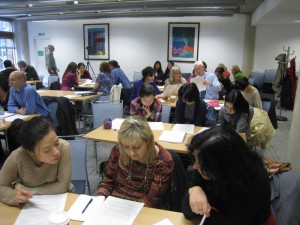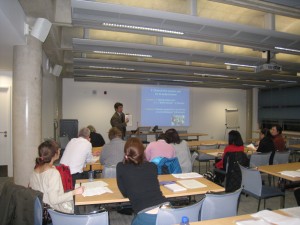Professor Kuno visited from Japan for a week and visited schools in Cambridge and Caddington, Central Bedfordshire to find about their approaches to Lesson Study. He gave two talks at the Faculty of Education on 12 March.
Professor Kuno’s talk focused on the a process used in some Japanese schools which captures archetypal public research lessons and helps to make them accessible to a wider audience than just those who were present on the day.
The process of Lesson Analysis involves teachers watching video recordings of the research lesson – or key sections of the research lesson having engaged with the research lesson plan, its aims and processes. They will often also review still photographs that capture aspects of the lesson.
 The second component of Lesson Analysis involves the participants engaging with a transcript of the research lesson. Professor Kuno introduced the research lesson through still pictures and video excerpts. He then asked participants to read the transcript of the research (which had been translated into English). However, this was no simple silent read through. He asked the participants to work in groups and read the transcript aloud – each taking on specific roles – the teacher and different pupils in the lesson.
The second component of Lesson Analysis involves the participants engaging with a transcript of the research lesson. Professor Kuno introduced the research lesson through still pictures and video excerpts. He then asked participants to read the transcript of the research (which had been translated into English). However, this was no simple silent read through. He asked the participants to work in groups and read the transcript aloud – each taking on specific roles – the teacher and different pupils in the lesson.He encouraged the participants to read the transcript slowly and carefully, imagining the thinking that was prompting the responses from pupils and teachers alike. And to pause to discuss the interactions and to piece together the learning that was going on as well as the obstacles and misconceptions that pupils (and teacher) encountered along the way.
It was the experience of reading the lesson transcript aloud that was the most novel and interesting. Articulating the words that the pupils had uttered in the lesson forced one to piece together hypotheses about their thought processes, conceptions and misconceptions. It brought another dimension to lesson analysis and if it is not possible to be involved in the actual research lesson or public research lesson or open house – it is an interesting way to engage with those pupils’ thought processes.
The down side of course is the task of transcribing the dialogue!!
Follow lessonstudyuk

